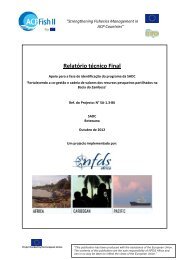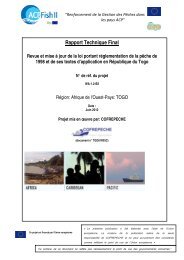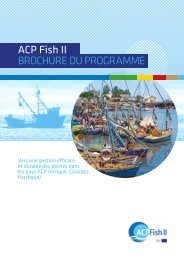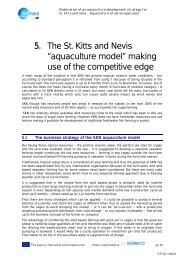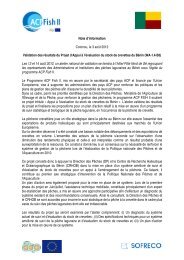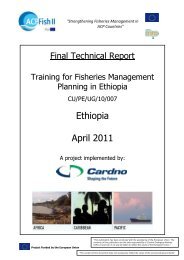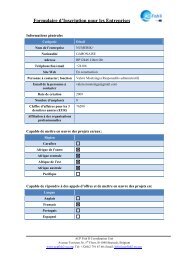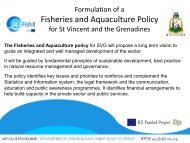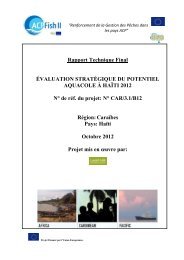Final Technical Report - ACP Fish II
Final Technical Report - ACP Fish II
Final Technical Report - ACP Fish II
You also want an ePaper? Increase the reach of your titles
YUMPU automatically turns print PDFs into web optimized ePapers that Google loves.
<strong>Final</strong> <strong>Report</strong>Megapesca Lda, Portugallonger term, the BNF is recommended to ensure that an annual training budget for the sector isallocated by the Ministry of Agriculture. The BNF and the <strong>ACP</strong> <strong>Fish</strong> <strong>II</strong> are also recommended toconsider providing support for the strengthening of the collective activities of female fish processorsand traders, by building their capacity to engage in a formal association.2 INTRODUCTIONThis report presents the activities and results of the project “<strong>Technical</strong> assistance on Training ofGroups of female fishmongers in good sanitary practices and management of small businesses”carried out under the EU funded Strengthening <strong>Fish</strong>eries Management in <strong>ACP</strong> States project (9<strong>ACP</strong>RPR 128) programme implemented by the EDF Funded <strong>ACP</strong> <strong>Fish</strong> <strong>II</strong> Programme.The specific objective of the project was to improve Liberia’s value chain of artisanal fisheriesproducts by strengthening the capacities of women fishmongers. The project designed andimplemented a pilot approach to training of female business operators in the supply chain whichcovered essential business and technical skills. The project was implemented by a team of two KeyExpert consultants from Megapesca Lda. of Portugal in association with AEDE of Liberia. Theproject objectives and terms of reference are shown in Annex 1.After home office preparations, Phase 1 commenced in Liberia on 10th July with the arrival in postof the Key Expert 1 (who remained in Liberia until 26th July). In line with the terms of reference,the activities during this Phase included a review of literature and previous/current interventions,undertaking of a training needs assessment exercise in three coastal communities, preparation ofcourse outline and logistics and preparation of two training handbooks.Phase 2 of the project took place during the period 22 nd September to 8 th October 2012. During thisperiod the consultants undertook the field testing of the course materials, delivered a pilot trainingto 36 female trainers from fishing communities and two staff from the Bureau of National <strong>Fish</strong>eries,and investigated options regarding sustainability of future training provision to small scale fishprocessors and traders.A list of persons met and a summary of activities is shown in Annex 2.3 BACKGROUNDIn Liberia there are an estimated 33,120 fulltime fish producers and processors in both marine andinland waters (mostly subsistence and under-developed commercial fisheries). According to a recentWorld Bank study 1 about 60 percent of these are women. Because their communities are frequentlyremote, these operators have few opportunities for alternative income generation. The sector hasdifficulty in accessing national, regional and international markets due to poor physical andinstitutional infrastructure, and a lack of technical skills to meet buyer requirements, includinginternational sanitary and quality standards. Liberia is at present not able to export fishery productsto the EU, a factor which encourages exploitation of national resources by foreign fleets flagged toother states which are authorized for exports by the European Commission. In recognition of thesocial dependency and the limited options available to the small scale sector, the Government ofLiberia provides policy support in the form of preferential access to coastal resources in the new<strong>Fish</strong>eries Law of 2010.1 Liberia: Gender-Aware Programs and Women’s Roles in Agricultural Value, Prepared by theWorld Bank’s Gender and Development Group (PRMGE), in collaboration with the Ministry ofGender and Development of Liberia (MOGD), World Bank, May 2010. See:http://siteresources.worldbank.org/EXTGENDER/Resources/LibGenAgrPolicyMem-Web-fin2.pdf<strong>Technical</strong> assistance on Training of Groups of female fishmongers in good sanitary practices and management of small businesses 2



